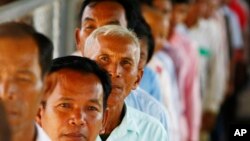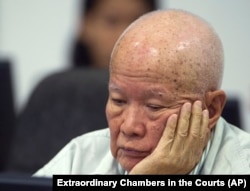A United Nations-backed tribunal has begun the second trial of the two surviving senior members of the Khmer Rouge.
Ex-head of state Khieu Samphan and chief ideologue Nuon Chea face genocide charges at the trial that began Wednesday in Phnom Penh.
The two aging leaders are already set to be sentenced on August 7 after being tried for crimes against humanity in the first trial that ended last year.
At the hearing Wednesday, Khieu Samphan appeared to be in good health, taking notes alongside his defense team. Nuon Chea did not attend.
The second trial will focus on the mass killings of hundreds of thousands of Cambodia's Vietnamese and Cham Muslim ethnic minorities.
Simach Smam, a Cham Muslim who survived the Khmer Rouge's 1975-1979 rule, was one of those attending the hearing.
"They killed many Muslim people. They cooked pork and told us to eat it. If we didn't eat it, we would be killed. They would also kill us if they saw us praying to Allah. I am so full of anger," he said.
Millions died
As many as 2 million Cambodians died during the four-year rule of the Khmer Rouge, which attempted to create a socialist utopia.
The first trial dealt with forced evacuations and the mass execution of soldiers during a civil war that lasted from 1970 until 1975, when the Khmer Rouge came to power.
The case was split into smaller trials in an attempt to deliver justice before the death of the Khmer Rouge leaders, who are in their 80s.
Lars Olsen, a court spokesman, said it is important that all Khmer Rouge victims get the chance to testify about their experiences.
"Together with the first trial, I believe the second one is necessary to get the representative picture about what really went on from 1975 to 1979. So it is very significant that all the range of criminal accusations will be addressed," Olsen said.
Former Khmer Rouge foreign secretary Ieng Sary died last year at age 87. His wife, Ieng Thirith, was later found mentally unfit for trial and released. Both had been defendants at the first trial, alongside Nuon Chea and Khieu Samphan.
Former Khmer Rouge prison chief Kaing Guek Eav, better known as "Duch," is the only person convicted by the tribunal so far. He was sentenced to life in prison for his role in killing more than 14,000 people while running the Tuol Sleng torture and execution center in Phnom Penh.
The group's leader, Pol Pot, died in 1998.






